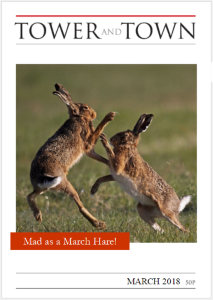

Tower and Town, March 2018 (view the full edition) (view the full edition)What’s In A Word?Isn't language funny? How, we might wonder, does Johnny Foreigner ever make sense of using bow [down], bough [tree], bow [ship], bow [tie], bow [and arrow]? Which word in English has the most different meanings? Answer: set - check it out. Curious too isn't it how a BBC reporter treks for days to a remote mountainside, 300 miles from the nearest toilet and the person interviewed expresses his views ...in English. Trek to some parts of the UK and one might ask (about native English speakers) "what language is he/she speaking?" Some meanings are of course lost in translation, although when Poirot asked Inspector Japp about his curious English, Japp replied "Stripe me, ain't nothing wrong with my lingo!" Over time, words have changed meanings and as we are told each year, the Oxford Dictionary 'new' word of the year is ...! Terry Wogan used to comment how people sat at home listening to the wireless waiting to be offended. Maybe nothing better shows this than the adverts for the clothing firm French Connection UK which received numerous complaints because their slogan FCUK caused offence to those waiting diligently to be offended. We use sayings in everyday speak, but from where did they emanate? Here are a few:
Garry Pells |